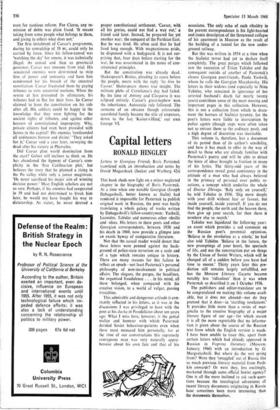Capital letters
RONALD HINGLEY
Letters to Georgian Friends Boris Pasternak translated with an introduction and notes by David Magarshack (Seeker and Warburg 42s)
This book sheds new light on a minor neglected chapter in the biography of Boris Pasternak. At a time when one notable Georgian (Joseph Dzhugashvili, better known as Stalin) had rendered it impossible for Pasternak to publish original work in Russian, the poet was busily translating a whole galaxy of works written by Dzhugashvili's fellow-countrymen: Yashvili, Leonidze, Tabidze and numerous other -shvilis and -idzes. His letters to these poets and other Georgian correspondents, between 1930 and his death in 1960, now provide a glimpse into an exotic byway of comparative literature.
Not that the casual reader would detect that these letters were penned against the back- ground of police-state terrorism on a scale and of a type which remains unique in history. There are many reasons for this failure to reflect an epoch—not least Pasternak's personal philosophy of non-involvement in political affairs. The slogans, the purges, the headlines, the organised fraudulence . . . in his mind, all these belonged, when compared with his creative vision, to a world of vulgar, passing trivialities.
This admirable and dangerous attitude is con- stantly reflected in his letters, as it was in the discussions I was privileged to have with the poet at his dacha in Peredelkino about ten years ago. What I miss here, however, is the genial malice and humour with which Pasternak derided Soviet behaviour-patterns even when these most menaced him personally, for at the time of our conversations this supremely courageous man was very naturally appre- hensive about his own fate and that of his
associates. The only echo of such ribaldry in the present correspondence is his light-hearted and ironic description of the threatened collapse of his apartment in Moscow as the result of the building of a tunnel for the new under- ground railway.
But this was written in 1934 at a time when the Stalinist terror had yet to declare itself completely. The great purges which followed saw the execution of Titian Tabidze and the consequent suicide of another of Pasternak's closest Georgian poet-friends, Paolo Yashvili, whom he calls the Georgian Mayakovsky. His letters to their widows (and especially to Nina Tabidze, who remained in ignorance of her arrested husband's death for nearly twenty years) contribute some of the most moving and important pages in this collection. However, this is not a collection from which to docu- ment the horrors of Stalinist tyranny, for the poet's letters were liable to interception by police agents (though steps were often taken not to entrust them to the ordinary post), and a high degree of discretion was inevitable.
This volume is, therefore, less a document of its period than of its author's sensibility, and here it has much to offer in the way of detail to those who are already familiar with Pasternak's poetry and will be able to detect the hints of ideas brought to fruition in many of his lyrics. The thirty-odd years of the correspondence reveal great consistency in the attitude of a man who had always believed in the primacy of personal over public re- actions, a concept which underlies the whole
of Doctor Zhivago. 'Rely only on yourself,' he told Tabidze in 1936. 'Dig more deeply with your drill without fear or favour, but inside yourself, inside yourself. If you do not find the people, the earth and the heaven there, then give up your search, for then there is nowhere else to search.'
Tabidze was liquidated the following year: an event which provides a sad comment on the Russian poet's perennial optimism.
`Believe in the revolution as a whole,' he had also told Tabidze. 'Believe in the future, the new promptings of your heart, the spectacle of life, and not the construction put on things
by the Union of Soviet Writers, which will be changed all of a sudden before you have had time to sneeze.' Thirty years later this pre- diction still remains largely unfulfilled, nor has the Moscow Literary Gazette become notably less 'ridiculous' than it• was when Pasternak so described it on 1 October 1936.
The publishers and editor-translator are to be congratulated on making this volume avail- able, but it does not abound—nor do they pretend that it does—in 'startling revelations.' It provides little more than a series of mar- ginalia to the creative biography of a major literary figure of our age—for which reason it is all the more regrettable that no informa- tion is given about the source of the Russian text from which the English version is made. I have been unable to trace this, apart from certain letters which had already appeared in
Russian in Voprosy literatury (Moscow, January 1966) with an introduction by G. Margvelashvili. But where do the rest spring
from? Were they 'smuggled' out of Russia like so much previous literary material from Push- kin onwards? Or were they, less excitingly, marketed through some.official Soviet agency? One is all the more inclined to ask such ques- tions because the textological adventures of recent literary documents originating in Russia have sometimes been more interesting than the documents themselves.










































 Previous page
Previous page